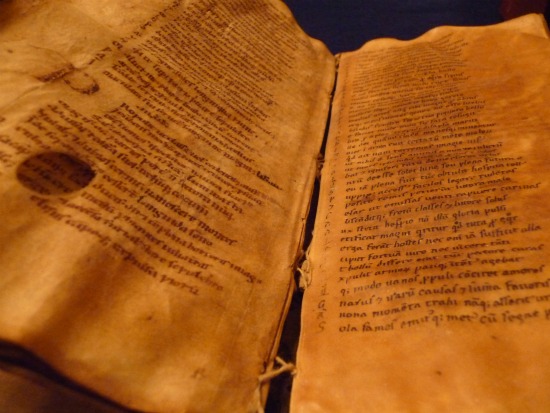It was written of the poet Lucan (Marcus Annaeus Lucanus, 39-65 C.E.) by his 17th century English translator Thomas May that when Lucan was born, “bees swarmed about the childes cradle, and pressed in clusters toward his mouth. A happy presage (as the learned interpreted it) of his future wit….”
Lucan was a Roman poet who lived and composed during the reign of Nero. Initially a favorite of the emperor, Lucan later joined a conspiracy against him, was captured, and was forced to commit suicide – at the age of 25 (the same age as John Keats when he died).
Lucan’s Pharsalia, or De bello civilli [Civil War], portrays the war between Julius Caesar and Pompey Magnus. The title refers to the Battle of Pharsalus (48 B.C.E.), in which Caesar defeated Pompey.
The Rubenstein Library’s Latin Manuscript 118 is a 12th century Italian manuscript of the Pharsalia. Acquired from Sotheby’s in 1969, the manuscript was written on parchment in a late Carolingian hand in brown ink, and was bound in the 15th century in goat skin over wood. In 86 parchment folios, the manuscript sits oblong in the hand, measuring 210 x 103 mm.

The Rubenstein has several early and significant printed editions of Lucan as well, the earliest published between 1493 and 1494 in Venice. An edition from 1515 was printed by the venerable firm of Aldus Manutius. The presence of the manuscript and several printed editions provide students and scholars with an opportunity to study the transmission, editing, and translation of Lucan’s work over the centuries.
The Early Manuscripts series of blog posts seeks to bring greater attention to the Rubenstein’s rich collections in Latin, Greek, and other early manuscript traditions.



Bart Huelsenbeck was please to see this post and was kind enough to get in touch to tell us about his scholarly article on this manuscript: Manuscripta 51.1 (2007): 21–59.
Dr. Huelsenbeck (Ph.D. Classical Studies 2009) is currently a postdoctoral fellow at Dickinson College (Carlisle, PA).